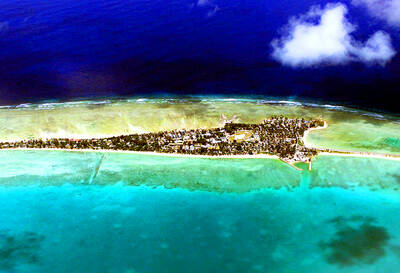Indian police yesterday planned to release sketches of suspects behind New Delhi bombings that left more than 20 dead, as criticism grew over the lack of a coherent national counterterrorism policy.
Karnal Singh, a senior police official investigating the five bombs that ripped through crowded markets in the Indian capital on Saturday, said several people had been taken in for questioning but no arrests had been made.
The attacks were claimed by the Indian Mujahideen, a shadowy Muslim militant group that also owned responsibility for bombings in July that killed at least 45 people in the cities of Ahmedabad and Bangalore.
“We hope to release suspect sketches today,” Singh said.
The Delhi blasts were the fourth in a major Indian city in as many months and have refueled debate over the ability of the security and intelligence forces to prevent such attacks and bring those responsible to justice.
“We are at war,” was the blunt assessment of an editorial in the Times of India. “When a country is at war, there cannot be any half measures to hit back and contain the enemy.”
The newspaper said the time had come for India’s political parties to cast aside their differences and “put their heads together to figure out a counter-strategy for which consensus will be essential.”
In 2004, India’s new Congress-led government scrapped an anti-terror law introduced by its Hindu nationalist predecessor after the attacks of Sept. 11, 2001.
The Congress argued that the legislation, which gave sweeping powers to the police, was being misused to settle political scores.
At the time, Indian prime minister Manmohan Singh vowed that repealing the law would not weaken the government’s ability to combat terrorism, but the recent spate of attacks has challenged that assertion.
“More than four years into its term, the government’s record on this account is looking even more shocking,” the Indian Express newspaper said.
“They have simply not done enough to bring closure to any of the terrorist incidents of the past four years, to follow leads thoroughly, to crack the organizations behind the incidents,” the Express said.
The Hindustan Times accused the government and the opposition of being too willing to “woefully sacrifice national consensus against a common enemy” at the altar of political one-upmanship.
“Going by the way we conduct our post-attack investigations and put into place barriers against future attacks, one would be forgiven for thinking we are new to terrorism,” it said.
Police said the death toll from Saturday’s blasts had risen to 22.
The toll could have been higher as three more bombs were defused, including a device found near India Gate, a major tourist attraction in the heart of Delhi.

DISASTER: The Bangladesh Meteorological Department recorded a magnitude 5.7 and tremors reached as far as Kolkata, India, more than 300km away from the epicenter A powerful earthquake struck Bangladesh yesterday outside the crowded capital, Dhaka, killing at least five people and injuring about a hundred, the government said. The magnitude 5.5 quake struck at 10:38am near Narsingdi, Bangladesh, about 33km from Dhaka, the US Geological Survey (USGS) said. The earthquake sparked fear and chaos with many in the Muslim-majority nation of 170 million people at home on their day off. AFP reporters in Dhaka said they saw people weeping in the streets while others appeared shocked. Bangladesh Interim Leader Muhammad Yunus expressed his “deep shock and sorrow over the news of casualties in various districts.” At least five people,

ON THE LAM: The Brazilian Supreme Court said that the former president tried to burn his ankle monitor off as part of an attempt to orchestrate his escape from Brazil Former Brazilian president Jair Bolsonaro — under house arrest while he appeals a conviction for a foiled coup attempt — was taken into custody on Saturday after the Brazilian Supreme Court deemed him a high flight risk. The court said the far-right firebrand — who was sentenced to 27 years in prison over a scheme to stop Brazilian President Luiz Inacio Lula da Silva from taking office after the 2022 elections — had attempted to disable his ankle monitor to flee. Supreme Court judge Alexandre de Moraes said Bolsonaro’s detention was a preventive measure as final appeals play out. In a video made

It is one of the world’s most famous unsolved codes whose answer could sell for a fortune — but two US friends say they have already found the secret hidden by Kryptos. The S-shaped copper sculpture has baffled cryptography enthusiasts since its 1990 installation on the grounds of the CIA headquarters in Virginia, with three of its four messages deciphered so far. Yet K4, the final passage, has kept codebreakers scratching their heads. Sculptor Jim Sanborn, 80, has been so overwhelmed by guesses that he started charging US$50 for each response. Sanborn in August announced he would auction the 97-character solution to K4

SHOW OF FORCE: The US has held nine multilateral drills near Guam in the past four months, which Australia said was important to deter coercion in the region Five Chinese research vessels, including ships used for space and missile tracking and underwater mapping, were active in the northwest Pacific last month, as the US stepped up military exercises, data compiled by a Guam-based group shows. Rapid militarization in the northern Pacific gets insufficient attention, the Pacific Center for Island Security said, adding that it makes island populations a potential target in any great-power conflict. “If you look at the number of US and bilateral and multilateral exercises, there is a lot of activity,” Leland Bettis, the director of the group that seeks to flag regional security risks, said in an